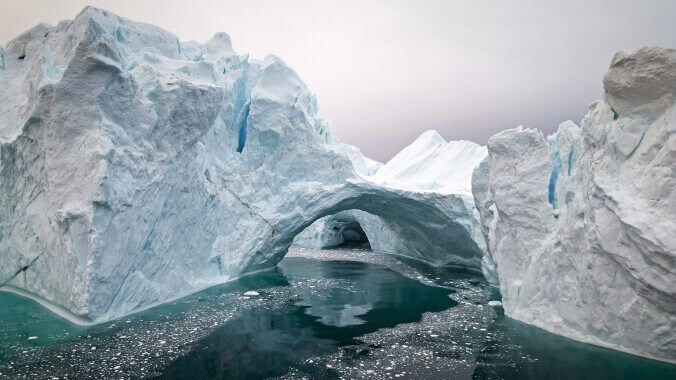Not Even Time is Safe From Climate Change
Photo by Hollandse Hoogte/Shutterstock
One of the strangest climate change-related tidbits out there is that as Greenland’s massive ice sheet melts and helps raise sea levels around the world, the seas around that island and its neighbors are actually falling. This happens for two reasons: the rock underneath the ice rebounds as the glacier shrinks, literally raising Greenland to higher ground; and the ice sheet’s diminishing size actually reduces its gravitational pull on the water at its doorstep.
This is another way of saying: the ice sheets are really, really big, and melting them does really, really weird stuff to the planet. Like screw with its rotation.
A study published in Nature on Wednesday found that the melting of the ice sheets has, remarkably, “decreased the angular velocity of Earth more rapidly than before.” It does this by pushing meltwater toward the equator, as well as with that same rebounding land effect that is helping Greenland’s sea level to drop. Essentially, the Earth is taking on a slightly different shape, which has an effect on the speed that it rotates. And that has an effect on time.
Or, more precisely, humans’ ability to keep time. The planet’s rotation was never constant to begin with, and to compensate for changes in the exact length of a day people began adding leap seconds to Coordinated Universal Time, the internationally agreed upon clock, in the early 1970s. This has happened a total of 27 times, but only five this century and not since 2016. As it turns out, changes to the earth’s core were speeding up our rotation, meaning a “negative leap second” would likely need to be added by 2026. The melting ice has changed the timeline, actually pushing it back by three years.
“Global warming is already affecting global timekeeping,” wrote the study’s author, Duncan Carr Agnew of U.C. San Diego’s Scripps Institution of Oceanography. The negative leap second was going to be a problem anyway — many computer systems critical to how the world functions today have ways to incorporate a leap second, but removing one isn’t quite so easy, according to Agnew. So in a sense the ice sheets have offered us a brief reprieve, a few extra years to get our affairs in order.
But much like Greenland’s deceptive falling sea levels — they won’t, of course, keep falling for long, as melting accelerates — the result shows the degree of chaos we continue to unleash. There’s a brand of climate change denial — less prevalent today than in the past, but still out there — that cites atmospheric systems’ immense size and complexity as a reason to doubt that humans are capable of altering them. Hard to imagine a better refutation of that argument than evidence that warming is changing the literal planet itself.